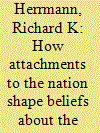| Srl | Item |
| 1 |
ID:
077105


|
|
|
|
|
| Publication |
2007.
|
| Summary/Abstract |
Although it would be nice if the intelligence community's tradecraft or the academic community's theories could predict the future, it is essential that international security experts learn quickly and accurately from unfolding history. This article reports on a multiyear study of experts dealing with security on the Korean Peninsula. It examines how experts learn and what can derail rational updating. Three factors common to much of the work in security studies contribute to the problem: the tendency to treat the intentions of other actors as unknowable private information that is beyond empirical examination; the inclination to believe that power provides a parsimonious explanation, even though it is multifaceted and dependent on numerous components; and the penchant for engaging in "factor wars" over which causal factors are most important while paying little attention to the cumulative and interactive effect of multiple factors. Collectively, these three factors produce overconfidence in hindsight and leave experts prisoners to their preconceptions. The article investigates in the Korean case whether translating narrative expert beliefs systems (i.e., theories) into Bayesian networks can open minds and promote more appropriate updating, and suggests that it can
|
|
|
|
|
|
|
|
|
|
|
|
|
|
|
|
| 2 |
ID:
153556


|
|
|
|
|
| Summary/Abstract |
If competing beliefs about political events in the world stem largely from information asymmetries, then more information and knowledge should reduce the gap in competing perceptions. Empirical studies of decision making, however, often find just the reverse: as knowledge and the stakes in play go up, the beliefs about what is happening polarize rather than converge. The theory proposed here attributes this to motivated reasoning. Emotions inside the observer shape beliefs along with information coming from the outside world. A series of experiments embedded in a national survey of Americans finds that a primary driver of the beliefs someone forms about globalization, other countries, and the politics in the Middle East is how strongly they attach their social identity to the United States. Attachment produces more intense positive and negative emotions that in turn shape the interpretation of unfolding events and lead norms to be applied in an inconsistent fashion. People, in effect, rewrite reality around their favored course of action, marrying the logic of appropriateness to their own preferences. Beliefs, consequently, are not independent of preferences but related to them. Motivated reasoning, while not consistent with rational models, is predictable and can lead to expensive mistakes and double standards that undermine liberal internationalism.
|
|
|
|
|
|
|
|
|
|
|
|
|
|
|
|